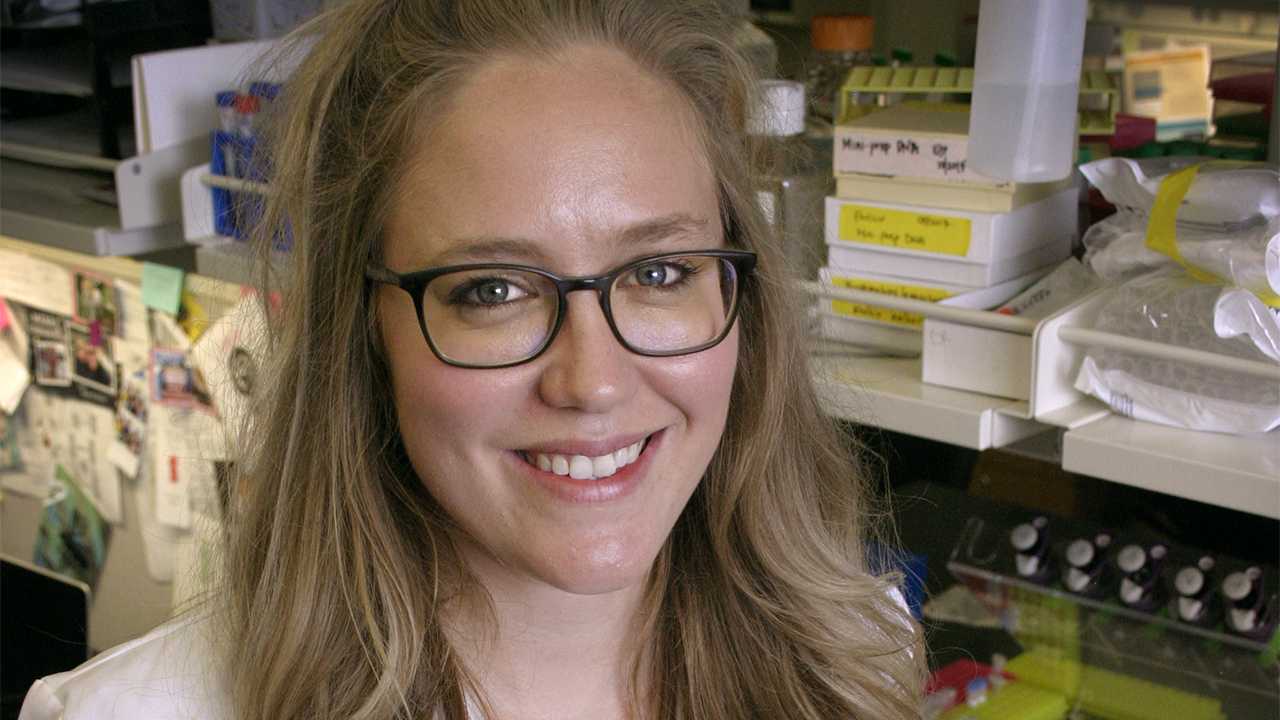
Emily J. Pomeroy, a recent PhD graduate of the Microbiology Immunology and Cancer Biology Program (MICaB) and a member of the Center for Genome Engineering (CGE), is launching the next phase of her career as a scientist at Prime Medicine, a biotech startup in Boston.
During her time as a graduate student at the University of Minnesota, Pomeroy conducted her thesis research in the Moriarity Lab, which focuses on using gene editing tools to create novel therapies. When she started in the lab in 2016, the field of gene editing was not where it is today, and there were not many researchers who could use it in every kind of cell type. The Moriarity Lab focused on an important gap in the field: finding ways to gene edit cell types that had been difficult, or impossible, to genetically engineer in the past. Making such an advancement could pave the way for many new types of cell therapies to treat devastating diseases, such as cancer.
As a gene editing expert, Moriarity assembled a diverse team of researchers who were experts in adjacent areas, including Pomeroy, who specialized in immunology. Together, they figured out how to successfully gene edit blood lineage cells like “Natural Killer” (NK) cells, which, as their name suggests, have a natural ability to kill cancer cells. Their research focused on using gene editing technology to engineer NK cells to more potently kill cancer, with the goal of delivering these engineered cells as a drug product to cancer patients. Pomeroy and Moriarity worked with the UMN Technology Commercialization office (Tech Comm) to file patent applications on their innovations.
“The Tech Comm office was extremely helpful because they laid out what we needed to do and formatted everything for us. I don’t think we could have done it on our own,” said Pomeroy. “The people who work at the Tech Comm office know a lot about science, which makes the process go a lot smoother.”
Pomeroy and Moriarity primarily worked with Technology Portfolio Manager (TPM) Dr. Anne Hall, and eventually submitted a total of four invention disclosures to Tech Comm, resulting in nine patent applications pending at the US Patent and Trademark Office (USPTO). Significantly, two of the patent applications have recently been licensed by Tech Comm to the biotech companies, Beam Therapeutics and Catamaran Bio, who will commercially implement Pomeroy and Moriarity’s innovations.
“I think getting involved in the Tech Comm office early in my first year of graduate school for this NK patent got me thinking in the mindset of an inventor, as well as a scientist, right at the beginning,” said Pomeroy. “By the end, in my fourth and fifth year of graduate school, Branden [Moriarity] and I came up with this brand new, blue sky idea, and we went through the filing process for that too.”
Although the pandemic was challenging for Pomeroy because the lab was shut down, it did afford her the time to think about her research, dig into the literature, come up with the blue sky idea for the last patent application that she filed with Tech Comm, and write an application that won her the 2020 Talaria Innovation Prize from the Center for Genome Engineering. After graduating from the UMN in May 2021, Pomeroy moved to Boston to work at the Prime Medicine biotech startup, which was partially inspired by her work with Tech Comm.
“I never thought I was going to move to Boston and leave the Twin Cities, but I got this opportunity,” said Pomeroy. “Having this on my resume was probably an attractive thing for my employer to see because I’ve participated in the commercialization process and it gives me an edge over others.”